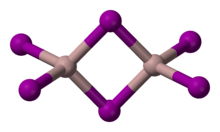Gallium(III) iodide
Gallium(III) iodide is the chemical compound with the formula GaI3. It is the most common iodide of gallium. In the chemical vapor transport method of growing crystals of gallium arsenide uses iodine as the transport agent. It also exists as a dimer, Ga2I6.[1]
 | |
| Names | |
|---|---|
| Other names
gallium triiodide | |
| Identifiers | |
3D model (JSmol) |
|
| ChemSpider | |
| ECHA InfoCard | 100.033.269 |
PubChem CID |
|
CompTox Dashboard (EPA) |
|
| |
| |
| Properties | |
| GaI3 | |
| Molar mass | 450.436 g/mol |
| Appearance | light yellow powder |
| Density | 4.15 g/cm3 |
| Melting point | 212 °C (414 °F; 485 K) |
| Boiling point | 345 °C (653 °F; 618 K) |
| decomposes | |
| −149.0·10−6 cm3/mol | |
| Hazards | |
EU classification (DSD) (outdated) |
not listed |
| NFPA 704 (fire diamond) | |
Except where otherwise noted, data are given for materials in their standard state (at 25 °C [77 °F], 100 kPa). | |
| Infobox references | |
Gallium triiodide can be reduced with gallium metal to give a green-colored solid called "gallium(I) iodide." The nature of this species is unclear, but it is useful for the preparation of compounds of gallium(I) and gallium(II) and is reported as useful in organic syntheses.[2][3]
References
- C. Brünig, S. Locmelis, E. Milke, M. Binnewies, "Chemischer Transport fester Lösungen. 27. Mischphasenbildung und chemischer Transport im System ZnSe/GaAs" Zeitschrift für anorganische und allgemeine Chemie 2006, 632, 6 , 1067 - 1072. doi:10.1002/zaac.200600008
- Baker, Robert J.; Jones, Cameron. ""GaI": A versatile reagent for the synthetic chemist" Dalton Transactions (2005), (8), pp. 1341-1348. doi:10.1039/b501310k
- GaI: A new reagent for chemo- and diastereoselective C–C bond forming reactions, Green SP, Jones C., Stasch A., Rose R.P, New J. Chem., 2007, 31, 127 - 134, doi:10.1039/b613669a
This article is issued from Wikipedia. The text is licensed under Creative Commons - Attribution - Sharealike. Additional terms may apply for the media files.
